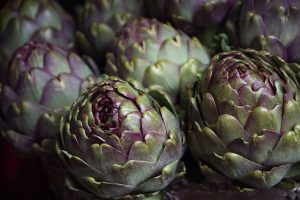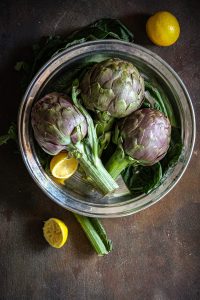
Artichokes are some of the most fascinating vegetables out there, with a unique flavor and texture that can be almost addicting to some. Their popularity is on the rise in recent years, as more and more people are discovering their delicious and nutritious qualities. But what are artichokes, exactly? What makes them so special and why should you be adding them to your diet? In this blog post, we’ll take a closer look at the artichoke, exploring its history, nutrition, health benefits, and tips for preparing and eating this vegetable.
The artichoke is a perennial plant that is native to the Mediterranean, with records suggesting its cultivation dates back all the way to Ancient Greece. It is a member of the sunflower family, and is related to cardoons and thistles. Its edible portion is actually an immature flower bud, making it a unique vegetable. Artichokes come in many sizes and colors, from deep purple to light green, but the most common variety is the globe artichoke.
Nutritional Benefits of Artichokes
Artichokes are one of the most nutritious vegetables you can find in the grocery store, and they have a wealth of health benefits to offer. They are high in fiber, vitamins, minerals, and antioxidants, making them an excellent addition to any healthy diet.
The artichoke is actually a flower bud from a thistle plant, and it has a unique flavor and texture. It has a sweet, nutty flavor, and the texture can range from crunchy and tender to creamy and soft. Artichokes are also packed with vitamins and minerals, making them a great source of nutrition.
Artichokes contain a high concentration of fiber, which helps to support digestive health. Fiber helps to keep you feeling fuller for longer, and it can also help to reduce cholesterol levels. The high levels of fiber in artichokes also helps to keep your bowels regular.
Artichokes also contain a variety of vitamins and minerals. They are an excellent source of vitamin K, which helps to keep your bones and teeth healthy. They are also a good source of vitamin C, which helps to support your immune system, and they contain vitamin B6, which helps to regulate your blood sugar levels.
In addition to vitamins and minerals, artichokes also contain antioxidants. These antioxidants help to protect your cells from damage caused by free radicals, which can lead to the development of chronic diseases like cancer. Artichokes are also a great source of manganese, a mineral that helps to maintain healthy bones and joints.
In addition to the vitamins and minerals, artichokes also contain phytonutrients. These phytonutrients are disease-fighting compounds that can help to protect your body from various illnesses. Artichokes contain a compound called cynarin, which has been shown to help lower cholesterol levels, and they also contain a compound called silymarin, which is believed to be beneficial for liver health.
History of Artichokes
The artichoke is one of those vegetables that has been around since the beginning of time. Its first known existence was in Sicily during the time of the ancient Greeks. Artichokes were then cultivated by the Romans, who called them “Cynara cardunculus”. The artichoke is actually a member of the thistle family and is native to a variety of Mediterranean countries.
Throughout the centuries, artichokes were prized for their culinary uses, medicinal properties, and even spiritual symbolism. The ancient Egyptians used artichokes to treat liver and kidney ailments, while the Greeks and Romans believed that it had aphrodisiac properties. The Romans also used artichoke flowers as a symbol of love and fertility, while the Greeks used them to symbolize good luck.
The artichoke was introduced to the United States in the late 19th century by French and Italian immigrants. While some of them planted the artichoke in their gardens, the majority of them were marketed for commercial purposes. Artichokes were grown in areas such as California, Arizona, and Texas. By the mid-20th century, artichokes were being grown in almost every state in the US.
Cooking with Artichokes

When cooking with artichokes, it’s important to select the ones that are fresh. Look for artichokes with tight, compact leaves that are bright in color and without any blemishes or discoloration. You’ll want to remove the tough outer leaves of the artichoke and then trim the stem to ensure it will cook evenly.
Before cooking, you’ll want to prepare the artichokes. If you’re using them in salads, you can simply rinse them and then cut them into quarters. If you’re using them in cooked dishes, you’ll want to steam them first. To do this, you’ll need to place the artichokes in a steamer basket or colander and then place them over a pot of boiling water. Cover the pot and let the artichokes steam for 15-20 minutes or until they are tender when pierced with a fork.
Once the artichokes are steamed, you can use them in a variety of dishes. They can be added to pasta dishes, casseroles, and soups. Roasted artichokes are a great addition to salads and sandwiches. You can also stuff the artichokes with your favorite fillings, such as seasoned bread crumbs, parmesan cheese, and herbs.
When using artichokes in recipes, you’ll want to add them towards the end of cooking. This will help to keep the artichoke’s texture and flavor intact. Additionally, you’ll want to make sure to add enough moisture to the dish so that the artichokes don’t dry out.
Clinical Trials on Artichokes
The first clinical trials on artichokes were conducted in the early 2000s. These trials sought to evaluate the effects of artichokes on cholesterol levels. The results of these trials suggested that artichoke extract could reduce total cholesterol and LDL (“bad”) cholesterol levels, although the effects were not statistically significant.
More recently, clinical trials on artichokes have focused on their potential to reduce inflammation. In particular, a recent study conducted in Italy found that artichoke extract was effective at reducing levels of the inflammatory marker, C-reactive protein (CRP). This study also found that artichoke extract was effective at reducing levels of LDL cholesterol, triglycerides and blood sugar.
In addition to inflammation and cholesterol, artichokes have also been studied for their potential to reduce the risk of cardiovascular disease and stroke. A meta-analysis of 10 randomized controlled trials found that artichoke extract reduced blood pressure and improved endothelial function, which is a measure of heart health.
Other studies have also evaluated the potential of artichokes to reduce the risk of certain types of cancer. A meta-analysis of 10 observational studies found that artichoke consumption was associated with a reduced risk of colorectal and gastric cancer. However, the evidence for this was not strong, and further research is needed to better understand the potential health benefits of artichokes.
Clinical trials on artichokes have also evaluated their potential to improve digestive health. A randomized controlled trial found that artichoke extract was effective at improving symptoms of irritable bowel syndrome (IBS). This suggests that artichoke extract could be a useful treatment option for people with IBS.